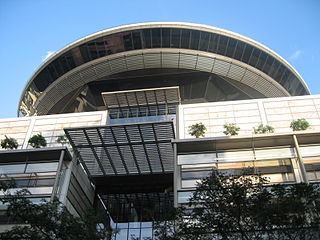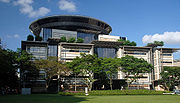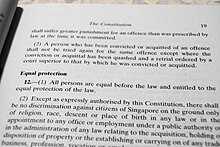
The Constitution of the Republic of Singapore is the supreme law of Singapore. A written constitution, the text which took effect on 9 August 1965 is derived from the Constitution of the State of Singapore 1963, provisions of the Federal Constitution of Malaysia made applicable to Singapore by the Republic of Singapore Independence Act 1965, and the Republic of Singapore Independence Act itself. The text of the Constitution is one of the legally binding sources of constitutional law in Singapore, the others being judicial interpretations of the Constitution, and certain other statutes. Non-binding sources are influences on constitutional law such as soft law, constitutional conventions, and public international law.

Article 12 of the Constitution of the Republic of Singapore guarantees to all persons equality before the law and equal protection of the law. The Article also identifies four forbidden classifications – religion, race, descent and place of birth – upon which Singapore citizens may not be discriminated for specific reasons. For example, discrimination on those classifications is prohibited in the appointment to any office or employment under a public authority or in the administration of any law relating to the establishing or carrying on of any trade, business, profession, vocation or employment.

Article 15 of the Constitution of the Republic of Singapore guarantees freedom of religion in Singapore. Specifically, Article 15(1) states: "Every person has the right to profess and practise his religion and to propagate it."

Chng Suan Tze v. Minister for Home Affairs is a seminal case in administrative law decided by the Court of Appeal of Singapore in 1988. The Court decided the appeal in the appellants' favour on a technical ground, but considered obiter dicta the reviewability of government power in preventive detention cases under the Internal Security Act ("ISA"). The case approved the application by the court of an objective test in the review of government discretion under the ISA, stating that all power has legal limits and the rule of law demands that the courts should be able to examine the exercise of discretionary power. This was a landmark shift from the position in the 1971 High Court decision Lee Mau Seng v. Minister of Home Affairs, which had been an authority for the application of a subjective test until it was overruled by Chng Suan Tze.

Teo Soh Lung v Minister for Home Affairs is the name of two cases of the Singapore courts, a High Court decision delivered in 1989 and the 1990 judgment in the appeal from that decision to the Court of Appeal. The cases were concerned with the constitutionality of amendments made to the Constitution of the Republic of Singapore and the Internal Security Act ("ISA") in 1989. The latter statute authorizes detention without trial on security grounds. These amendments had the effect of changing the law on judicial review of executive discretion under the ISA by re-establishing the subjective test enunciated in the 1971 High Court decision Lee Mau Seng v Minister for Home Affairs which had been overruled in 1988 by Chng Suan Tze v Minister for Home Affairs, and limiting the right of judicial review to ensuring compliance with procedures specified in the ISA. In other words, the amendments were intended to render the exercise of power by the President and the Minister for Home Affairs under the ISA to detain persons without trial not justiciable by the courts. Both the High Court and Court of Appeal found that these amendments were constitutional because Parliament had done nothing more than enact the rule of law relating to the law applicable to judicial review. Thus, the amendments validly operated to deprive the applicant Teo Soh Lung of the ability to apply to the courts for judicial review.

Errors as to precedent facts, sometimes called jurisdictional facts, in Singapore administrative law are errors committed by public authorities concerning facts that must objectively exist or not exist before the authorities have the power to take actions or make decisions under legislation. If an error concerning a precedent fact is made, the statutory power has not been exercised lawfully and may be quashed by the High Court if judicial review is applied for by an aggrieved person. The willingness of the Court to review such errors of fact is an exception to the general rule that the Court only reviews errors of law.

The remedies available in Singapore administrative law are the prerogative orders – the mandatory order, prohibiting order (prohibition), quashing order (certiorari), and order for review of detention – and the declaration, a form of equitable remedy. In Singapore, administrative law is the branch of law that enables a person to challenge an exercise of power by the executive branch of the Government. The challenge is carried out by applying to the High Court for judicial review. The Court's power to review a law or an official act of a government official is part of its supervisory jurisdiction, and at its fullest may involve quashing an action or decision and ordering that it be redone or remade.

Yong Vui Kong v. Public Prosecutor was a seminal case decided in 2010 by the Court of Appeal of Singapore which, in response to a challenge by Yong Vui Kong, a convicted drug smuggler, held that the mandatory death penalty imposed by the Misuse of Drugs Act ("MDA") for certain drug trafficking offences does not infringe Articles 9(1) and 12(1) of the Constitution of Singapore.

Public Prosecutor v. Taw Cheng Kong is a landmark case decided in 1998 by the Court of Appeal of Singapore which shaped the landscape of Singapore's constitutional law. The earlier High Court decision, Taw Cheng Kong v. Public Prosecutor, was the first instance in Singapore's history that a statutory provision was struck down as unconstitutional. The matter subsequently reached the Court of Appeal when the Public Prosecutor applied for a criminal reference for two questions to be considered. The questions were:
- whether section 37(1) of the Prevention of Corruption Act ("PCA") was ultra vires the powers of the legislature on the ground that the legislature had, under section 6(3) of the Republic of Singapore Independence Act 1965, been divested of the power to legislate extraterritorially; and
- whether section 37(1) of the PCA was discriminatory against Singapore citizens and hence inconsistent with Article 12(1) of the Constitution of the Republic of Singapore.

Article 14 of the Constitution of the Republic of Singapore, specifically Article 14(1), guarantees to Singapore citizens the rights to freedom of speech and expression, peaceful assembly without arms, and association. However, the enjoyment of these rights may be restricted by laws imposed by the Parliament of Singapore on the grounds stated in Article 14(2) of the Constitution.

Administrative law in Singapore is a branch of public law that is concerned with the control of governmental powers as exercised through its various administrative agencies. Administrative law requires administrators – ministers, civil servants and public authorities – to act fairly, reasonably and in accordance with the law. Singapore administrative law is largely based on English administrative law, which the nation inherited at independence in 1965.

Illegality is one of the three broad headings of judicial review of administrative action in Singapore, the others being irrationality and procedural impropriety. To avoid acting illegally, an administrative body or public authority must correctly understand the law regulating its power to act and to make decisions, and give effect to it.

Ong Ah Chuan v Public Prosecutor is a landmark decision delivered in 1980 by the Judicial Committee of the Privy Council on appeal from Singapore which deals with the constitutionality of section 15 of the Misuse of Drugs Act 1973 ("MDA"), and the mandatory death penalty by the Act for certain offences. The appellants contended that the presumption of trafficking under section 15 of the MDA violated Article 9(1) of the Constitution of the Republic of Singapore and that the mandatory death penalty was arbitrary and violated Article 12(1) of the Constitution.

Threshold issues are legal requirements in Singapore administrative law that must be satisfied by applicants before their claims for judicial review of acts or decisions of public authorities can be dealt with by the High Court. These include showing that they have standing to bring cases, and that the matters are amenable to judicial review and justiciable by the Court.

Chan Hiang Leng Colin v. Public Prosecutor is a 1994 judgment of the High Court of Singapore delivered by Chief Justice Yong Pung How which held that orders issued by the Government deregistering the Singapore Congregation of Jehovah's Witnesses under the Societies Act and banning works published by the Watch Tower Bible and Tract Society ("WTBTS") under the Undesirable Publications Act did not violate the right to freedom of religion guaranteed by Article 15(1) of the Constitution of Singapore.

The remedies available in a Singapore constitutional claim are the prerogative orders – quashing, prohibiting and mandatory orders, and the order for review of detention – and the declaration. As the Constitution of the Republic of Singapore is the supreme law of Singapore, the High Court can hold any law enacted by Parliament, subsidiary legislation issued by a minister, or rules derived from the common law, as well as acts and decisions of public authorities, that are inconsistent with the Constitution to be void. Mandatory orders have the effect of directing authorities to take certain actions, prohibiting orders forbid them from acting, and quashing orders invalidate their acts or decisions. An order for review of detention is sought to direct a party responsible for detaining a person to produce the detainee before the High Court so that the legality of the detention can be established.
Fettering of discretion by a public authority is one of the grounds of judicial review in Singapore administrative law. It is regarded as a form of illegality. An applicant may challenge a decision by an authority on the basis that it has either rigidly adhered to a policy it has formulated, or has wrongfully delegated the exercise of its statutory powers to another body. If the High Court finds that a decision-maker has fettered its discretion, it may hold the decision to be ultra vires – beyond the decision-maker's powers – and grant the applicant a suitable remedy such as a quashing order to invalidate the decision.

Procedural impropriety in Singapore administrative law is one of the three broad categories of judicial review, the other two being illegality and irrationality. A public authority commits procedural impropriety if it fails to properly observe either statutory procedural requirements, or common law rules of natural justice and fairness.

Re Shankar Alan s/o Anant Kulkarni was a 2006 administrative law judgment in which the High Court of Singapore quashed a decision made by the Disciplinary Committee of the Law Society of Singapore against a lawyer, Alan Shankar s/o Anant Kulkarni. The Disciplinary Committee had found Shankar, who was a solicitor, guilty of grossly improper misconduct under the Legal Profession Act. Shankar applied to the High Court for judicial review on the ground that the Committee's ruling was affected by apparent bias.

Vellama d/o Marie Muthu v. Attorney-General was a 2013 decision of the Court of Appeal of Singapore which held that Article 49(1) of the Constitution requires the Prime Minister to call a by-election when a casual vacancy arises in a Single Member Constituency ("SMC"), though the election need only be called within a reasonable time.















